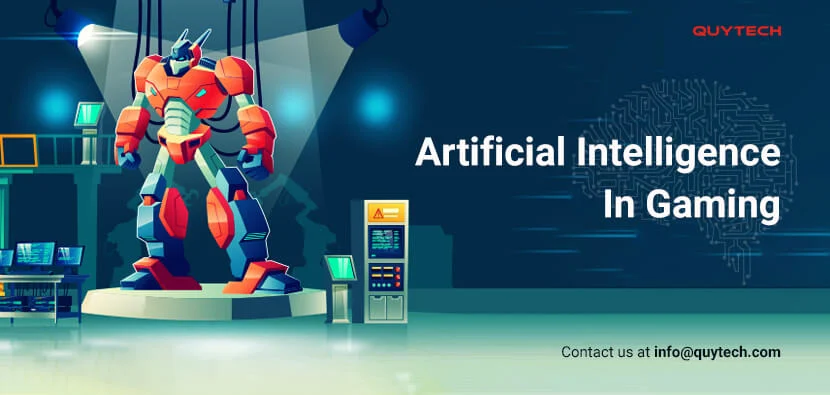The Impact of AI on Game Development has been significant in recent years, with artificial intelligence playing a crucial role in shaping the gaming industry. AI has revolutionized the way games are designed, developed, and played, leading to more immersive experiences for players. Game developers are increasingly using AI to create realistic environments, intelligent non-player characters, and adaptive gameplay, enhancing the overall quality of games. As a result, AI has become an essential tool for game development, driving innovation and pushing the boundaries of what is possible in the gaming world.
The use of AI in game development has sparked curiosity and interest in how it is transforming the industry. From procedural generation and personalized gaming experiences to advanced enemy behavior and dynamic difficulty adjustments, AI has opened up new possibilities for game designers. Additionally, AI-powered tools and algorithms have streamlined the development process, allowing for more efficient creation and testing of games. This has led to a growing demand for AI expertise in the gaming industry, as developers seek to harness the full potential of this technology to create the next generation of immersive and engaging games.
The Evolution of AI in Game Development
In recent years, the use of artificial intelligence (AI) in game development has significantly evolved, revolutionizing the way games are designed and played. AI algorithms and technologies have become integral in creating immersive and engaging gaming experiences, from non-player character (NPC) behavior to procedural content generation. Game developers now utilize AI to enhance game environments, create realistic and challenging opponents, and personalize player experiences based on their behavior and preferences. As AI continues to advance, it is expected to further shape the future of game development, offering new possibilities for innovation and creativity.
Enhancing Player Experience with AI
AI has played a crucial role in enhancing the overall player experience in games. Through AI-powered systems, game environments can dynamically adapt to player actions, providing personalized challenges and opportunities for exploration. AI-driven NPCs can exhibit more complex and realistic behavior, making interactions with virtual characters more engaging and immersive. Additionally, AI enables the implementation of adaptive difficulty levels, ensuring that players of all skill levels can enjoy a balanced and rewarding gaming experience. By leveraging AI, game developers can create richer, more immersive worlds that respond intelligently to player input, ultimately leading to more satisfying and memorable gaming experiences.
AI and Procedural Content Generation
Procedural content generation, coupled with AI algorithms, has transformed the way game worlds are created and populated. AI can be used to generate diverse and realistic landscapes, structures, and ecosystems within games, offering virtually limitless possibilities for exploration and discovery. By employing AI-powered procedural generation, developers can efficiently create expansive game worlds with unique and varied content, reducing the need for manual design and increasing the overall depth and replay value of games. This approach also enables the creation of dynamic, ever-changing environments that respond to player interactions, fostering a sense of immersion and unpredictability.
AI for Realistic and Adaptive Opponents
AI has been instrumental in creating more realistic and adaptive opponent behavior in games. Through sophisticated AI algorithms, non-player characters and enemies can exhibit lifelike decision-making, strategic thinking, and emotional responses, providing players with challenging and dynamic adversaries. AI-powered opponents can learn and adapt to player tactics, making each encounter feel unique and compelling. Furthermore, AI enables the implementation of advanced enemy behaviors, such as teamwork, coordination, and self-preservation, resulting in more immersive and intense gameplay experiences. As AI continues to advance, the potential for creating even more intelligent and lifelike opponents in games is virtually limitless.
AI for Streamlining Game Development Processes
AI technologies have been instrumental in streamlining various aspects of game development, from asset creation to bug testing and quality assurance. Machine learning algorithms can be used to automate the generation of textures, animations, and other visual assets, reducing the time and effort required for content creation. AI-powered tools also aid in identifying and addressing bugs and performance issues, improving the overall stability and polish of games. Moreover, AI can analyze player data and feedback to inform design decisions, helping developers create more engaging and marketable games. By integrating AI into different stages of game development, developers can optimize workflows, reduce production costs, and ultimately deliver higher-quality games to players.
The Ethical and Social Implications of AI in Games
The widespread use of AI in game development has raised ethical and social considerations regarding its impact on players and society as a whole. Concerns about AI-driven manipulation, addiction, and privacy have prompted discussions about the responsible use of AI in games. Additionally, the portrayal of AI-powered characters and themes in games has sparked debates about the representation of AI and its implications for our understanding of intelligence and consciousness. As AI technology continues to advance, it is imperative for game developers to consider the ethical and social implications of their use of AI, ensuring that games remain inclusive, respectful, and mindful of the potential impact on players and society.
AI and the Future of Game Design
The integration of AI into game development has opened up new possibilities for game design, offering innovative ways to create compelling and immersive experiences. AI-driven procedural generation, adaptive gameplay systems, and dynamic storytelling tools are reshaping the way games are conceptualized and developed. As AI technology continues to advance, we can expect to see even more sophisticated and personalized gaming experiences that adapt to individual player preferences and behaviors. Furthermore, AI has the potential to enable entirely new genres of games and interactive experiences, pushing the boundaries of creativity and imagination in the gaming industry. The future of game design is intertwined with the evolution of AI, presenting exciting opportunities for developers to explore and innovate.
Conclusion
In conclusion, the impact of AI on game development has been substantial, transforming the way games are designed, played, and experienced. AI has enhanced player immersion, enabled procedural content generation, and elevated the overall quality and depth of games. As AI technology continues to advance, it is poised to further revolutionize game development, offering new avenues for creativity and innovation. However, the ethical and social implications of AI in games must be carefully considered to ensure that gaming experiences remain inclusive, respectful, and mindful of their impact on players and society. Ultimately, the integration of AI into game development represents a significant step forward, shaping the future of gaming in exciting and unprecedented ways.
| Aspect | Impact |
|---|---|
| Game Design | AI can be used to create more complex and unpredictable game environments, leading to more immersive gameplay experiences. |
| Character Behavior | AI algorithms can be used to develop non-player characters (NPCs) with more realistic and human-like behavior, enhancing the overall gaming experience. |
| Procedural Content Generation | AI can be employed to generate game content such as levels, maps, and quests, reducing the need for manual content creation and increasing the scalability of games. |
| Player Engagement | AI-powered systems can analyze player data and behavior to personalize gaming experiences, leading to higher player engagement and retention. |
| Quality Assurance | AI can be used for automated testing and bug detection, improving the overall quality and stability of games. |
The impact of AI on game development is profound, touching various aspects such as game design, character behavior, procedural content generation, player engagement, and quality assurance. AI technologies have the potential to revolutionize the gaming industry by creating more immersive, personalized, and high-quality gaming experiences for players.



